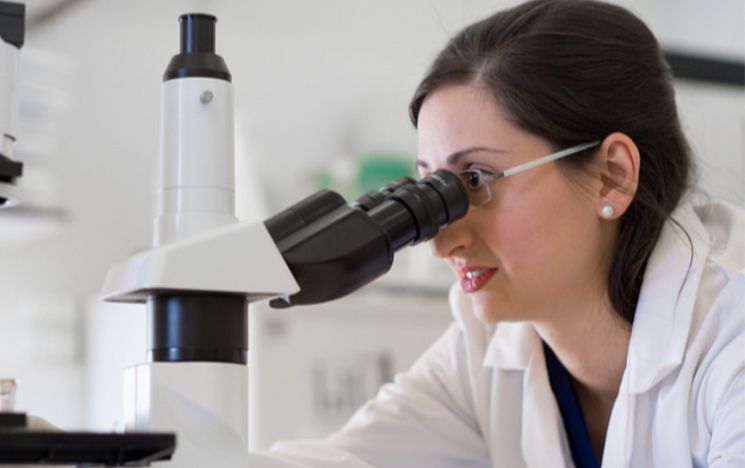Biochemistry and Biomedicine
Our research can be summarised by the exploration of disease-causing genes and proteins and approaches to maintaining human and animal health.

Research areas
Our work ranges from cell-based genome and proteome-wide analyses to experiments at single molecule resolution using cell biology, structural biology and bioinformatics.
Our research covers four areas of expertise. Find out more about the work of our scientists in each area:
- Gene expression
We study how genes underpin complex life and we use this knowledge to better understand and treat diseases.
Gene expression is a complex, dynamic process which determines the function of a cell. We strive to understand the intricate mechanisms of this process and the role that it plays in various diseases and developmental disorders. ”PROFESSOR MICHELLE WEST
Professor of Tumour Virology
Our faculty
- Alexandros Bousios: Function and evolution of plant genomes
- Leandro Castellano: RNA in epithelial cancer initiation and progression
- Erika Mancini: Chromatin remodelling and transcription
- Ethan Morgan: HPV-associated cancers and protein ubiquitination
- Rhys Morgan: Cell signalling and the development of leukaemia
- Simon Morely: Signalling pathways in eukaryotic cells
- Mark Paget: Gene expression in bacteria
- Michelle West: Epstein-Barr virus celluar reprogramming and transformation
Our research groups
Find out about the work we are doing in our research groups:
- Biotechnology and Informatics
We use biotechnology and bioinformatics to understand a range of biological data and to produce biological resources. This includes developing insecticides and fungicides to support food security, predicting compound/drug interactions and producing novel materials.
Our faculty
- Alexandros Bousios: Function and evolution of plant genomes
- Leandro Castellano: RNA in epithelial cancer initiation and progression
- Neil Crickmore: Bacillus thuringiensis and its insecticidal toxins
- Georgios Giamas: Cell signalling and translational cancer
- Frances Pearl: Bioinformatics and Cheminformatics
- Chrisostomos Prodromou: Molecular chaperones especially Hsp90
- Ben Towler: RNA regulation in proliferation and cellular stress
- Ed Wright: Epidemology and antigenicity of (re)emerging viral zoonoses
Our research groups
Find out about the work we are doing in our research groups:
- Cancer Biology
We study and aim to further understand diseases which become rapidly more frequent with ageing. Our expertise lies with cancer and neurodegeneration, such as Alzheimer's disease.
Our faculty
- Leandro Castellano: RNA in epithelial cancer initiation and progression
- Georgios Giamas: Cell signalling and translational cancer
- Erika Mancini: Chromatin remodelling and transcription
- Ethan Morgan: HPV-associated cancers and protein ubiquitination
- Rhys Morgan: Cell signalling and the development of leukaemia
- Simon Morely: Signalling pathways in eukaryotic cells
- Frances Pearl: Bioinformatics and Cheminformatics
- Chrisostomos Prodromou: Molecular chaperones especially Hsp90
- Ben Towler: RNA regulation in proliferation and cellular stress
- Michelle West: Epstein-Barr virus celluar reprogramming and transformation
Our research centres and groups
Find out about the work we are doing in our research centres and groups:
- Infectious disease
We focus on the properties of infectious diseases, the impact that they have on human and animal health and the development of new treatments.
Our faculty
- Ethan Morgan: HPV-associated cancers and protein ubiquitination
- Mark Paget: Gene expression in bacteria
- Chrisostomos Prodromou: Molecular chaperones especially Hsp90
- Michelle West: Epstein-Barr virus celluar reprogramming and transformation
- Ed Wright: Epidemology and antigenicity of (re)emerging viral zoonoses
Our research groups and centres
Who we work with
We have many important internal collaborations with the:
We also work closely with many external research partners.
We are grateful to all of our funders which include:
- the Medical Research Council
- The Biotechnology
- Bioscience Research Council
- Cancer Research UK
- The Wellcome Trust
- Bloodwise
- Action Against Cancer
- Wysta Laboratories
- The Kay Kendall Leukeamia Research Fund
- Agform Ltd
- The European Union
- Evotech UK
- The Royal Society
- Innovate UK and more.
Head of Department of Biochemistry and Biomedicine
Contact
If you have any queries, contact our Head of Department: Dr Leandro Castellano at L.Castellano@sussex.ac.uk.